 |
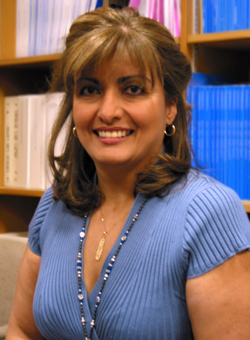
|
|
Vivian Morales, Medical and Clinical Laboratory Technologist, Department of Laboratory Medicine, Clinical Center, NIH
|
1. I chose this career because...
2. My typical workday involves...
3. What I like best/least about my work...
4. My career goals are...
5. When I'm not working, I like to...
|
|
1. I chose this career because...
|
Back to Top

|
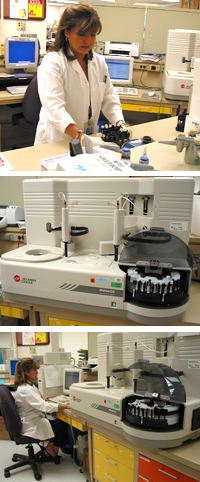
|
|
Vivian uses an instrument that quantitates the different classes of immunoglobulins (or antibodies) that are present in patient serum samples.
|
I chose to become a Medical Technologist because I always knew I wanted a career in healthcare. My parents were both teachers and education was always a priority in our house. They encouraged my brother and me to pursue a higher education and consider careers in top fields such as engineering, law, and medicine. During high school, I started to look for possibilities in the healthcare system. I discovered the Post Bachelor program for Medical Technology (MT) at the University of Puerto Rico. I liked the curriculum; it was a short but intense program that would allow me to have a professional career in a few years. It was also very competitive to get into the program. In order to meet the prerequisite courses necessary to apply, I worked towards a degree in Biology. Because my father wanted to make sure I had an alternative career in case the MT program did not work out, I decided to minor in Education, to teach science as an alternative. After completing my Biology degree, the MT applications and interviews, I was accepted into the program. I’ll never forget the first time I put on a lab coat while in the MT program. I knew then that I was on my way to a very exciting career.
My first job was in a large reference lab in Puerto Rico. We received patient samples from the whole island because our lab was the only one with the sophisticated equipment and skilled staff to do the work. As a recent graduate, I worked in several departments and learned a lot of new techniques. At the same time, I applied what I learned in school to the new work environment. After a year and a half, I felt that I needed a greater challenge. What greater challenge could there be than to move to the United States and try to conquer a new country, language, job and people.
I applied to the federal government through the Office of Personnel Management. On the application form, you could select the location where you preferred to work. I chose the Washington D.C. area because my brother lived there. Six months later, I got a call from a supervisor of a Microbiology lab at Walter Reed Army Medical Center in Washington, D.C. (http://www.wramc.amedd.army.mil/). She told me about the open position and asked if I was interested. I said “yes” right away. I didn’t think about what it all meant until I started completing all the paperwork. My father was once in the Army and he was ecstatic. I decided to give myself a year to figure out if it was the life for me. Once I was here and working for a while I thought, “I can do this.”
After 4 years, I moved to a research position at the Walter Reed Army Institute of Research (http://wrair-www.army.mil/). I developed monoclonal antibodies for warfare agents, with the aim of developing effective vaccines against certain infectious diseases. Eventually the primary investigator I worked for moved on, and I began to look for other positions. I was interested in returning to a clinical setting, which is why I applied for my current position at the NIH. I was selected out of several applicants and have been here for 10 years.
College Education
- Bachelor of Science, Biology major, Education minor, University of Puerto Rico (http://www.upr.edu/), San Juan, Puerto Rico
- Medical Technology, Post-Baccalaureate Certificate in Medical Technology. College of Health Related Professions, University of Puerto Rico, Medical Science Campus (http://cprsweb.rcm.upr.edu/tecnologiamedica.asp), San Juan, Puerto Rico
Certifications
- Medical Technologist, National Exam, American Society for Clinical Pathologist (ASCP, http://www.ascp.org/).
- Medical Technologist, Puerto Rico Department of Health, Junta Examinadora de Technologos Medicos de Puerto Rico, College of Medical Technologist of Puerto Rico, http://www.ctmpr.org
Continuing Education
I must complete 12 credits of Continuing Education each year to remain certified and licensed as a Medical Technologist in Puerto Rico. Every three years, I must submit all the classes I have completed to get recertified.
|
|
2. My typical workday involves...
|
Back to Top

|
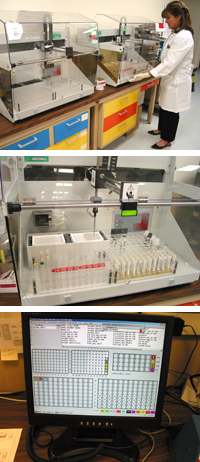
|
|
Vivian sets up an automated ELISA (Enzyme-Linked ImmunoSorbent Assay) machine that tests for various proteins in patient serum, such as the antinuclear antibody associated with autoimmune diseases.
|
My typical workday starts at 7:00 am and ends at 3:30 pm. As a Medical Technologist, I work closely with other health professionals to deliver quality healthcare to the patients. I am responsible for performing laboratory tests on patient samples in an accurate and timely manner. Doctors at the NIH Clinical Center, rely and depend on these tests to care for their patients.
The Department of Laboratory Medicine Has 4 Sections
Our laboratory is divided into 4 sections (Chemistry, Hematology, Microbiology, and Immunology) based on the laboratory tests that are performed and the basic science behind them. I work in the Immunology section, where each member is trained to do all of the procedures. The section is set up to perform specific protocols at different workbenches. We do rotations around the different workbenches in the section, which keeps our skills up to date and makes the job interesting.
Our laboratory receives blood samples from in-patients and out-patients who are at the NIH in various clinical research protocols. The accessioning area is a location in the lab where patient samples are delivered from all over the clinical center. Part of my job includes picking up samples at the accessioning area and processing them according to our protocols. I must check the area regularly, because new samples arrive throughout the day.
Usually a research nurse or a physician places the orders for the different tests they want performed on the patient sample. These orders go into a computerized system that tracks patient information, and records clinical and research results. Once our section has completed the tests and confirmed their accuracy, we post the data in the system. Physicians have access to this system, and use the lab results to help diagnose and treat patients appropriately.
Typical Daily Tasks:
- Preventative maintenance on all instruments
- Quality control procedures to verify quality and accuracy of the reagents and the instruments used for a specific test
- Test patient samples according to the doctors orders along with control samples, examine data for accuracy. If results are acceptable, they are recorded into the computer system and become accessible to the patient’s physician.
- Troubleshoot any problems that arise, whether they may be with the patient samples, our test reagents and equipment, or the analysis of data
Tests I Perform
I perform a variety of tests that detect substances in patient serum such as:
- Antinuclear Antibody – antibodies that attack the patients own healthy tissues, often present in people with certain autoimmune diseases (http://www.nlm.nih.gov/medlineplus/autoimmunediseases.html).
- Cytomegalovirus (http://www.cdc.gov/cmv/) - a common virus in the United States, which can be harmful to babies in utero and at the time of birth
- Quantitative Immunoglobulins (IgA, IgD, IgG, IgE, and IgM) - are the different classes of antibody proteins that function in human immune responses. Elevated or low levels of the antibodies can give valuable clues to physicians about patient health. The test for immunoglobulins is performed in an instrument by nephelometry (http://www.nlm.nih.gov/medlineplus/ency/article/003545.htm).
|
|
3. What I like best/least about my work...
|
Back to Top

|
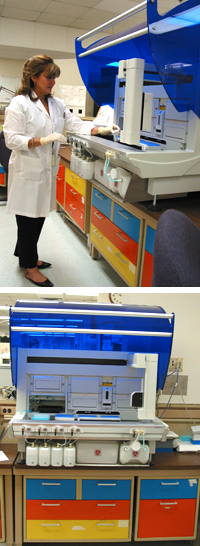
|
|
Using another ELISA (Enzyme-Linked ImmunoSorbent Assay) machine, Vivian tests patients samples for the cytomegalovirus.
|
What I like best about my work is the satisfaction of providing quality test results as a member of the healthcare team. I am very proud to be part of a team working to help patients get better.
What I like least about my work is the stress and the pressure I put on myself to do a good job. I always strive to perform my work in a timely and accurate fashion, and try to do my best for our patients. Patient care is top priority.
|
|
4. My career goals are...
|
Back to Top

|
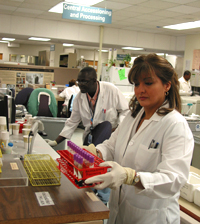
|
|
Vivian picks up patient samples that require testing in the Immunology section at the accessioning area of the Department of Laboratory Medicine.
|
My career goals are to continue to provide quality services as part of the healthcare team. As a Medical Technologist, you work independently at your bench, but you are also part of a bigger team. You are the health professional behind a test result. I feel very lucky because I’ve worked in some of the top medical facilities in the country.
|
|
5. When I'm not working, I like to...
|
Back to Top

|
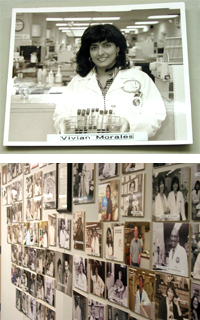
|
|
The Department of Laboratory Medicine has an entire wall covered with photographs of the various professionals who have worked there, including one of Vivian Morales when she first came to the NIH.
|
When I’m not working, I like to spend time with my family and friends. Growing up in Puerto Rico, music and dance was always part of my life. I enjoy salsa dancing and latin music. Marc Anthony is one of my favorite salsa singers. I also enjoy making jewelry (beading), reading, watching movies, and shopping.
|
|
|
|
 |